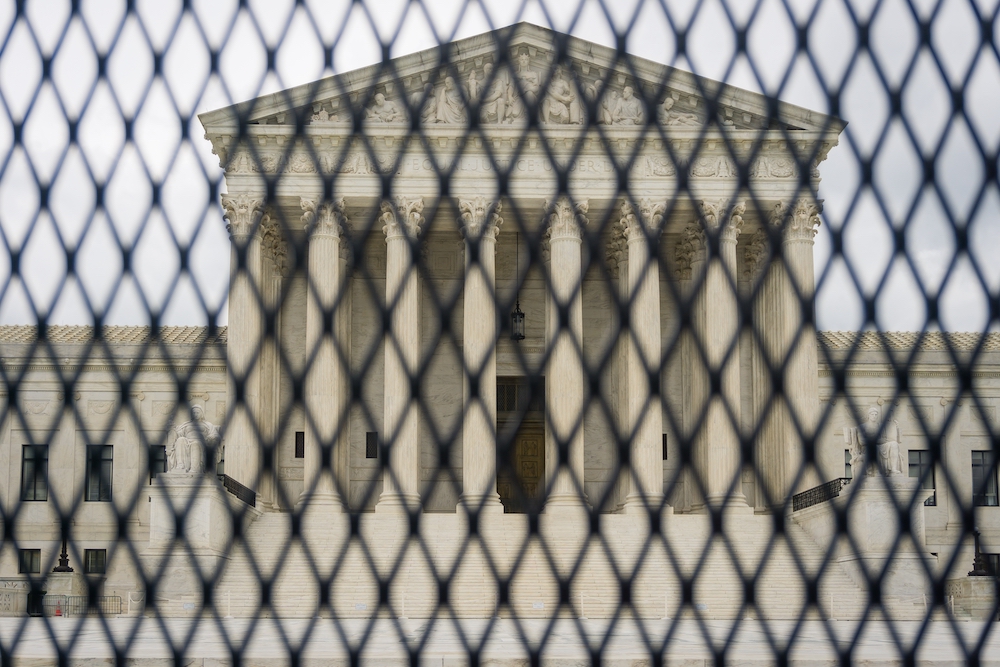BLOG: Awaiting Major Cases in the Shadow of Dobbs

As we enter the final weeks of the Supreme Court’s October 2021 term, all eyes, understandably, are on Dobbs v. Jackson Women’s Health. Earlier this month, a leaked draft opinion by Justice Samuel Alito confirmed the worst fears of reproductive justice and civil liberties advocates—that the Court is poised to overturn both Roe v. Wade and Planned Parenthood v. Casey. While the draft opinion could still change, its uncompromising posture has consumed Supreme Court watchers of all stripes. But Dobbs is not the only major ruling the Court will release in the coming weeks. We are still waiting on decisions in significant cases ranging from the environment to immigration to criminal justice. These cases may not receive the same attention as Dobbs, but depending on how the Court decides them, they could also be consequential, with far-reaching implications for many.
In a case called West Virginia v. Environmental Protection Agency (EPA), for example, the Court is considering whether a regulation issued by the EPA to reduce greenhouse gas emissions from power plants was authorized by the Clean Air Act (CAA), the landmark environmental legislation passed in 1963 to empower the EPA to issue regulations aimed at reducing air pollution. At the Supreme Court, the parties challenging the rule argued that it violates the so-called “major questions doctrine” and that Congress must speak “with unmissable clarity” before authorizing an agency to address matters with major political or economic significance. According to the challengers, the Supreme Court must apply this “major questions” rule as a way of enforcing a constitutional prohibition on laws that delegate legislative authority to agencies—the so-called “nondelegation doctrine.” There is no basis in constitutional text or history for the claim that there is a strict nondelegation doctrine, but if the Court were to embrace the challengers’ argument, it could have huge implications. In this case, it might mean that Congress would have to delineate the exact means of carbon dioxide emissions reduction for the EPA to act. More broadly, it could significantly hamstring the ability of Congress to delegate authority to executive branch agencies with issue-area expertise. After all, this doctrine would give courts significant discretion to determine what constitutes “major political or economic significance,” and thus require Congress to speak with “unmissable clarity” before delegation to an agency.
In Biden v. Texas, the Court is considering a case that could have significant consequences for the ability of the executive branch to function properly in another context—the conduct of U.S. immigration and foreign policy. In 2019, the Trump Administration implemented the Migrant Protection Protocols (MPP), which requires certain noncitizens arriving at the southwest border to remain in Mexico during the pendency of their immigration proceedings. Last year, the Biden Administration terminated that policy. A district court judge in Texas, however, held that a provision of the Immigration and Nationality Act imposes a statutory obligation to return to a contiguous territory—like Mexico—all arriving noncitizens who are not clearly admissible and whom it lacks the capacity to detain. To comply with this obligation, the judge ordered DHS to reinstate MPP. In effect, the district court’s ruling requires the executive branch to send noncitizens into the territory of a foreign sovereign and thus has the potential to have significant implications for the nation’s foreign policy. As Justice Breyer pointed out at oral argument, these kinds of questions with major foreign policy implications are generally viewed as “above [judges’] pay grade.”
And Biden v. Texas isn’t the only immigration case on the Court’s docket. Two other outstanding immigration cases could have significant impacts on individual freedom. In consolidated cases called Johnson v. Arteaga-Martinez and Garland v. Aleman Gonzalez, the Court will determine whether noncitizens who are imprisoned pending their deportation are entitled to bond hearings in which the government must persuade an immigration judge of the need for continued detention. According to the federal government, a federal statute allows it to detain noncitizens indefinitely, without a hearing before a judge or other independent decisionmaker. If the government’s interpretation of the statute were right, it would raise serious constitutional concerns. As we explained in a brief we filed in the case, longstanding British and American legal tradition safeguards the right to be free from wrongful imprisonment, and that right has long been enjoyed by citizens and noncitizens alike. Consistent with that tradition, the Fifth Amendment’s due process protections apply to noncitizens and citizens equally.
Finally, in Vega v. Tekoh, the Supreme Court is considering whether police officers who detain and question suspects without providing Miranda warnings can be held accountable when the statements they obtain are used against those suspects in a criminal trial. In this case, police officer Carlos Vega interrogated Terrence Tekoh without reading him his Miranda rights, including his right against self-incrimination. After statements Tekoh made in the course of that interrogation were used against him in a criminal prosecution, he sued Vega under 42 U.S.C. § 1983, a landmark civil rights statute that allows individuals to recover damages when state officers violate their constitutional rights. The Court’s decision could determine whether Miranda warnings are constitutionally required and whether and when individuals have recourse when their constitutional rights are violated.
While the lion’s share of public attention to the Court over the next couple of months will surely and understandably be on Dobbs, the Court will also be deciding other hugely consequential cases. Those cases, depending on what the Court does, could have dramatic effects on individual liberty and the functioning of the federal government.
